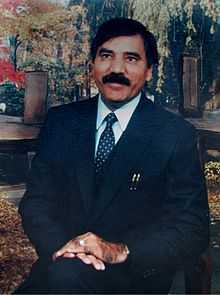Mujaddid Ahmad Ijaz
| Mujaddid Ahmed Ijaz | |
|---|---|
 | |
| Born |
July 16, 1937 Lahore, British Indian Empire |
| Died |
July 14, 1992 (aged 54) Shawsville, Virginia, United States |
| Citizenship | United States |
| Nationality | Pakistan |
| Fields | Theoretical Physics |
| Institutions |
Pakistan Atomic Energy Commission Quaid-e-Azam University Virginia Tech Oak Ridge National Laboratories |
| Alma mater |
Florida State University, M.S. Ohio University, Ph.D. |
| Known for | Nuclear Energy Programme |
| Spouse | Dr. Lubna Razia Ijaz, Ph.D. |
| Children |
Musawer Mansoor Ijaz Farouk Ahmed Ijaz (1963-2012) Atif Javed Ijaz Mujeeb Ismael Ijaz Neelam Rubina Ijaz-Ahmad |
Mujaddid Ahmed Ijaz, (Urdu: مجدد احمد اعجا ز; July 16, 1937— July 14, 1992), D.Phil, was a Pakistani theoretical physicist and professor of physics at Virginia Tech University who was noted and known for his work with sub-atomic and hypothetical particles, and his early role in during Pakistan's early stages of nuclear energy programme.[1][2]
A native of Lahore, Ijaz received his B.Sc. in Physics from Government College, followed by M.Sc. from Florida State University, and PhD in Theoretical physics from Ohio University from the United States. Initially joined the Virginia Polytechnic faculty, Ijaz returned to Pakistan to conducted his research in theoretical physics from Pakistan Atomic Energy Commission and remained associated with his country's nuclear energy programme during the early stages.[1] He took participation, as member of Pakistan delegation, in Atoms for Peace negotiation between United States and Pakistan to established the nuclear industries and nuclear research institutes and facilities for the research on nuclear technology.[1]
In 1972, Ijaz joined the atomic bomb project by first becoming the member of Theoretical Physics Group (TPG), and was presented at a meeting with then-Prime minister Zulfikar Ali Bhutto asked the scientists to initiate the work on the atomic bomb,..[3] He remained a professor of physics at the Quaid-e-Azam University throughout his life and taught courses on particle physics in Pakistan and the United States. Dr. Ijaz retired Professor Emeritus of Physics at Virginia Tech University after a 26 year career in a tenured position.[1] He authored 60 research papers from Pakistan Atomic Energy Commission and Oak Ridge National Laboratories on new hypothetical particles.[1]
He collaborated with Dr. Abdus Salam, a Pakistani theoretical physicist who won the Nobel Prize in Physics for his work on the electroweak unification of the electromagnetic and weak forces. Salam, Sheldon Glashow and Steven Weinberg shared the 1979 Nobel prize for this discovery.[4] Salam holds the distinction of being the first Pakistani and the first and only Muslim to receive a Nobel prize in Physics.[5]
See also
- Mansoor Ijaz, Mujaddid's eldest son, born 1961
Further reading
- Pakistan's Nukes: Another Side of Story
- Musawer Mansoor Ijaz – America's Secret Emissary"
- Department of Physics
References
- ↑ 1.0 1.1 1.2 1.3 1.4 "Obituaries: Mujaddid Ahmed Ijaz, Nuclear Scientist, 55". The New York Times. The New York Times Company. July 14, 1992. Retrieved 2011.
- ↑ Ijaz, Mansoor (February 11, 2004). "Not All of Pakistan's Nuclear Scientists Were Rogues". Mansoor Ijaz, chairman of Crescent Investment Management, LLC. Mansoor Ijaz, M.S. (Mechanical engineering) and B.S. (nuclear physics) and the Christian Science Monitor. Retrieved 2011.
- ↑ Mansoor Ijaz. "Nuclear Pardon". Retrieved 29 December 2011.
- ↑ "1979 Nobel Prize in Physics". Nobel Prize.
- ↑ (Ghani 1982, pp. i–xi)